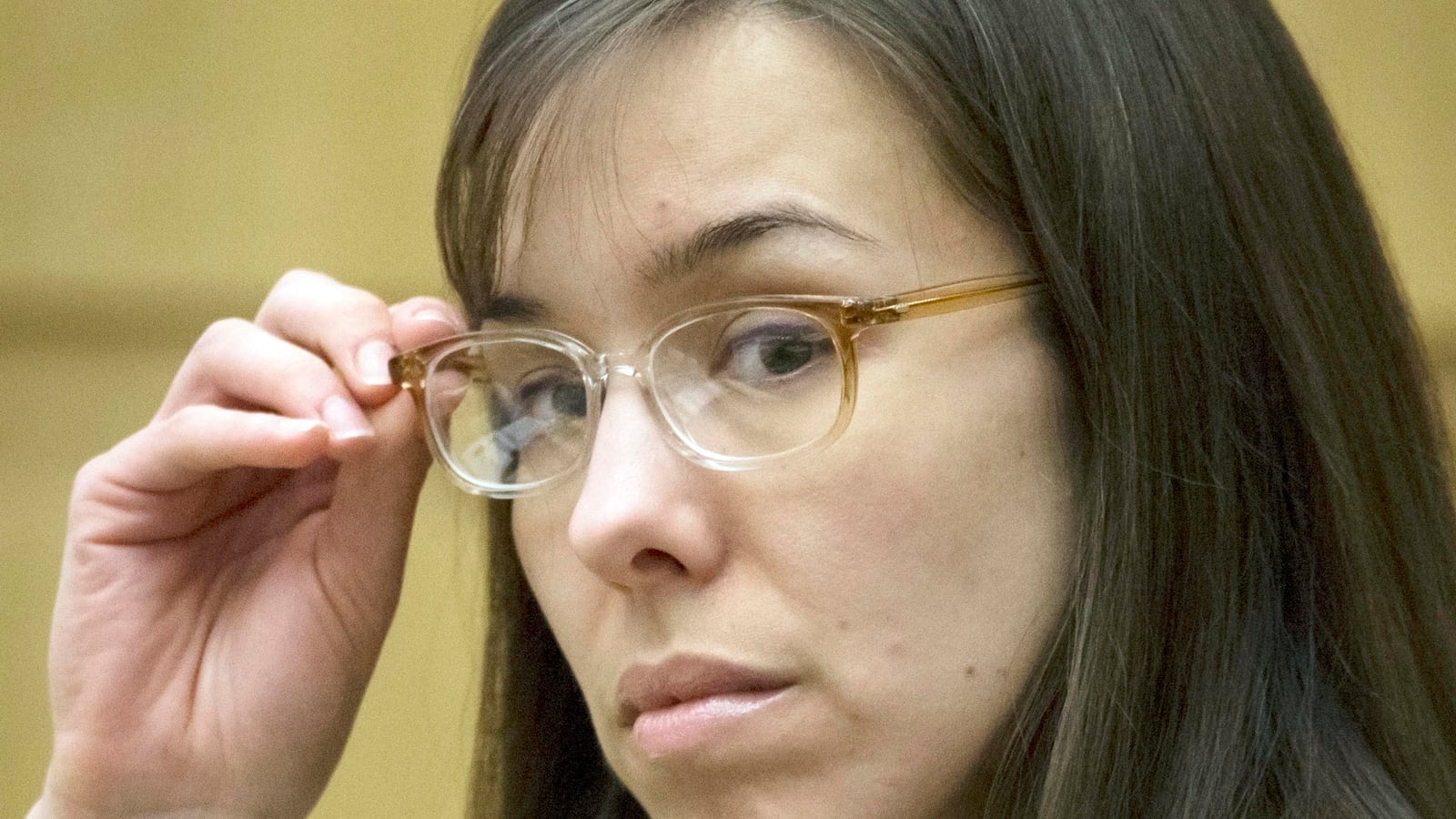Her trial, with its salacious tales of kinky sex, lies, stalking, and a bloody shower scene, gripped the nation for months and spawned a Lifetime movie.
Now, as closing arguments are under way in the case of Jodi Arias, court watchers can’t help wondering: can she pull a Casey Anthony and walk free?

Arias is charged with first-degree murder in the brutal slaying of her 30-year-old ex-boyfriend in his Phoenix home five years ago and faces the possibility of death if she is convicted. Travis Alexander, a Mormon and former motivational speaker, was found in his shower with 27 stab wounds, a slit across his throat, and a gunshot wound to the head. Countering the prosecution’s tale of a blonde bombshell with a penchant for sex talk who blew up in a fit of extreme jealous rage, Arias’s lawyers have argued that their defendant, 33, was caught in a relationship that turned abusive and was pushed to the brink.
The trial, which began in January, was a spectacle from the start.
“You have everything from religion and the Mormon faith, to very attractive people with their lives in front of them, to sex and jealousy,” says Phoenix criminal defense lawyer Julio Laboy. “All of those things that draw people to the movies, playing out in your own living room. You don’t even have to pay a fee.”
As to how this show will end, most legal analysts don’t predict a happy ending for the star, especially after her raunchy 18-day testimony, which shocked viewers with stories of bedroom antics and erotic adventures.
“She is going to be convicted of first-degree murder,” concludes Phoenix criminal defense attorney Mel McDonald. “She comes across as fatal attraction to the extreme. Glenn Close should have waited for this role. The issue is whether she’s going to get the death penalty.”
There’s also a slim possibility that the jury will accept Arias’s claims of abuse and find her guilty of manslaughter, Arizona defense attorney Vladimir Gagic says. “I think there is quite a bit of evidence that Travis was not a saint and he had bad tendencies,” Gagic says. “He wasn’t all that was cracked up to be, and she had some reason to be fearful.”
But if she’s acquitted, he says, “she will be the most hated person in the world until George Zimmerman goes on trial.”
Arias dated Alexander for several months and then continued a sexual relationship with him after they broke up. She initially denied killing him, then later blamed it on masked intruders. She changed her story for a third time after she was arrested in July 2008, claiming that she killed Alexander in self-defense.
During the four-month trial, defense attorneys claimed that Arias suffered from posttraumatic stress, amnesia, and battered woman’s syndrome from the verbal and physical lashings she allegedly endured at the hands of Alexander, whom they described as a womanizer and closet pedophile. Arias claimed she had once caught him pleasuring himself while looking at photos of a little boy wearing only underwear.
Prosecutors, on the other hand, say she was driven to violence when she realized Alexander wanted to end the affair and killed him in a jealous rage.
“Arias tried desperately to try and paint herself as the victim in this story when in fact the real victim is Travis Alexander,” says Arizona forensic psychiatrist Dr. Steven Pitt.
Pitt says the defense was never able to successfully explain how PTSD and battered woman’s syndrome could have caused Arias to stab the victim so many multiple times, slit his throat, and shoot him.
“I think that the defense did the best they could with the hand they were dealt, but at the end of the day, I don’t think the jury will buy any of it,” he says. “There were too many inconsistencies between what Arias said took place and the physical evidence. This is a woman who knew exactly what she was doing and then attempted, albeit in a feeble and clumsy way, to cover her tracks.”
One of the turning points of the trial, experts say, occurred when prosecutor Juan Martinez asked Arias, who had been crying on the stand after an intense exchange, “Did you cry when you were stabbing [Alexander]?”
“I thought that was extremely powerful,” says Laboy. “So much of this is marred in science and experts and legalism, but that was real-people stuff. Everybody can understand that.”
Laboy predicts that the jury will have a difficult time getting past the fact that Alexander was shot with a .25-caliber handgun, and a gun with the same type of caliber was stolen from Arias’s grandparents home in northern California a week before the slaying. “That to me, along with everything else, would be hard to get past,” he says.
McDonald believes the moment in the case that sealed Arias’s fate occurred long before the trial began. “The web she wove snared her a long time before she entered the courtroom,” he says. “I feel awful for the family of the young man to be exposed to this, but the [defense’s] duty is to present the best possible case, and they did a good job under staggering odds, and those odds were created by Arias.”
The jury will likely take a few days to come to a decision. “I don’t think it will be a quick deliberation, only because a cluster of the jury members are very conscientious, detail-oriented and want to do their jobs,” says LaBoy. “I don’t think it will be a rush verdict.”






